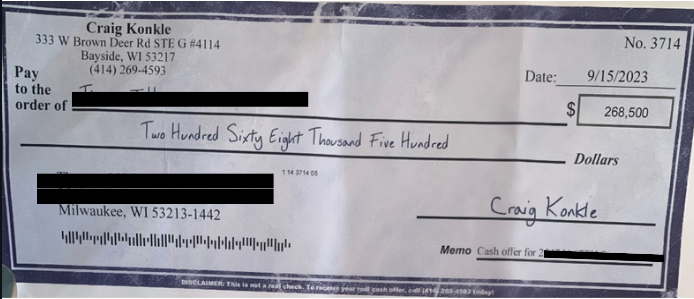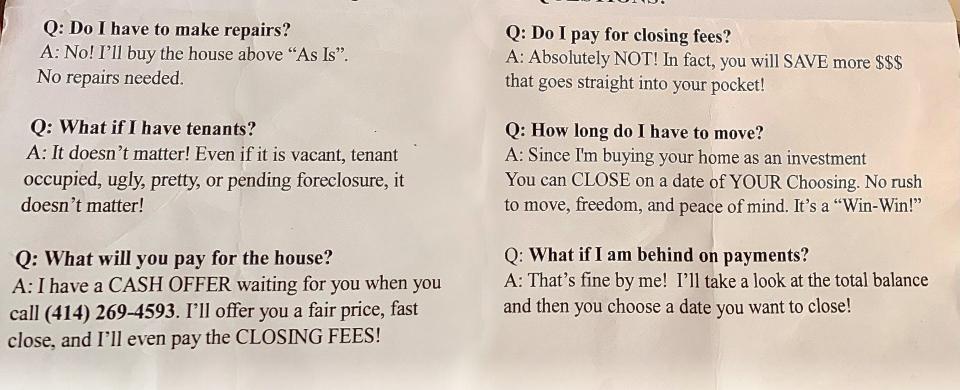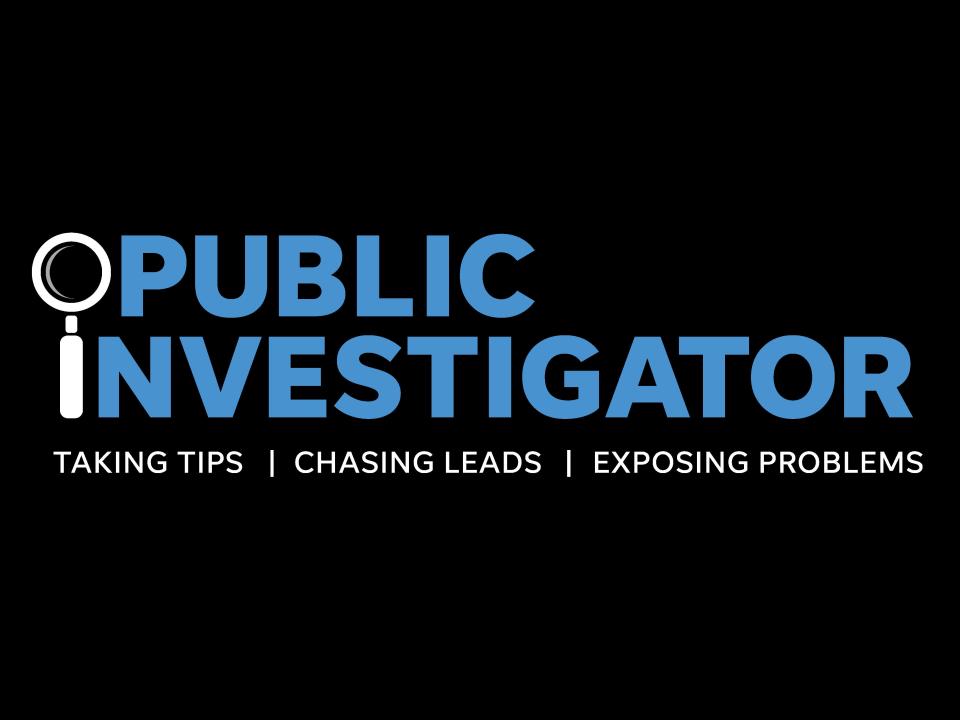A Wauwatosa homeowner got an unsolicited cash offer to buy their home. Here's why it's likely too good to be true

You've been wanting to sell your house, but even starting the process feels daunting. That's when a flyer comes in the mail with a cash offer to buy your home — zero questions asked.
The flyer says a salesperson is interested in buying your house in any condition, even if you're facing foreclosure. You won't even have to pay closing fees.
In September, one of these flyers offering $270,000 was placed in a Wauwatosa homeowner's mailbox.
"However, if I don't hear from you within seven days from the receipt of this letter, your cash offer could expire," warned the flyer, which was submitted to the Journal Sentinel to review.
While this could seem like a godsend for someone looking to sell their home, real estate finance expert Vada Lindsey said red flags are all over this advertisement.
While she's seen ads like these before, she's never seen an ad as "egregious as this one," said Lindsey, a law professor at Marquette University.
"I would never recommend anyone — even if that person is under some type of pressure to sell — I would never recommend that they contact this person and sell the property this way," Lindsey said.
Here are some red flags to look out for, and why Lindsey says ads like these are likely too good to be true.

Our Public Investigator team wants to hear your tips, chase the leads and uncover the truth, anywhere in Wisconsin. Submit tips at jsonline.com/tips.
Scammers could put homeowner at risk of identity theft or fraud
As someone who's cautious of identity theft, Lindsey said she wouldn't have given this ad a second look.
"(Scammers) can be pretty savvy when it comes to trying to manipulate and trying to exploit individuals," Lindsey said.
For example, this ad tells the homeowner to deposit their cash offer check only "after closing."
This could be an attempt by a scammer to steal someone's home, according to Lindsey. If a homeowner signs over the title to their home, the check could bounce, she said.
According to the Federal Trade Commission, the amount of money lost to scams is rising, with a record-breaking $8.8 billion lost to fraud in 2022.
"Usually when you sell a house, there's a three-day period when you can cancel, for example," Lindsey said. "We're not seeing anything like that here (on the flyer)."
Scammers may impersonate property sellers and buyers
According to a survey of 93 real estate firms by fraud protection software company CertifID, 73% of real estate firms have seen an increase in "seller impersonation fraud" attempts since the start of 2023.
Seller impersonation fraud is when a scammer impersonates a property owner or buyer.
The "licensed real estate salesperson" named on the flyer may not be the actual person behind the ad, Lindsey said.
One red flag Lindsey pointed out is that Realtors often don't call themselves a "salesperson." Usually, they'll call themselves a broker or an agent.
The ad lists Craig Konkle as the real estate "salesperson" and notes that there will be "NO commissions on the sale of your property."

The Journal Sentinel called the number listed on the ad. An individual who said they were the listed real estate agent's assistant said they would call back when the agent was back from vacation the following week. They never did. When called again two weeks later, the assistant said he was still unavailable.
The Journal Sentinel could not verify if the person named on the flyer is actually connected to the advertisement. A local Realtor with the same name did not return requests for comment.
The ad's urgency is another red flag
Lindsey said the advertisement's use of buzzwords that prey on someone's vulnerabilities are also red flags.
These buzzwords include the ad's urgency, telling the homeowner to call within seven days, even if their home is in foreclosure or in need of repairs.
"So, (the ad is) really trying to catch on a number of vulnerabilities that individuals may be encountering right now, especially given the economy," Lindsey said.
The ad's claim that the offer is void in seven days is a "pressure technique," she added.
Cash offers for property aren't uncommon, Lindsey said. However, she said the cash offer's unnecessary urgency does not reflect the true process of selling a house.
"It's a big deal to sell your house," Lindsey said.
More: Housing market glossary: 25 real estate-related terms you should know, from FICO to escrow
These ads likely offer less than the home's actual value
University of Wisconsin-Madison clinical law professor Mitch said the price listed is likely less than what the homeowner would get by listing their home for sale publicly.
By looking up your address on sites like Realtor.com or Zillow.com, you can find out how much both your property and others in the area are worth.
The advertisement's "cash offer" is $154,200 less than the home's estimated value on Realtor.com, and $95,000 below what's on Zillow.
Homeowners interested in selling should always find out their home's value, Lindsey said, which is why it's beneficial to hire a real estate appraiser to determine the fair market value.
"Lenders are going to get the property appraised before they agree to provide a mortgage," Lindsey added.
These ads are often sent out in bulk, also in the form of texts
The fake check at the top of the ad appears to be one of the many marketing methods people are using to buy and then resell homes for profit, Mitch said.
"The idea is that sending out lots of letters or texts could be worth it if they get enough responses from people looking to sell," he said.
Many large real estate investing companies send out a wide net of spam texts to find owners of distressed properties who are looking to get rid of them quickly. Some realtors may hire companies to distribute spam texts to find available properties, the Journal Sentinel reported in March.
The information on the Wauwatosa flyer included the homeowner's name and address, which are both publicly available in property records.
"I would venture to say that this has been sent to a lot of people," Lindsey said, "(and) that this individual was not the only one who received it."
Lindsey said when it comes to offers like this flyer — complete with a fake check and a seven-day time limit — people shouldn't call the number advertised.
"This is scary," Lindsey said. "It's scary to me for individuals to receive this and to make that phone call."
About Public Investigator
Government corruption. Corporate wrongdoing. Consumer complaints. Medical scams. Public Investigator is a new initiative of the Milwaukee Journal Sentinel and its sister newsrooms across Wisconsin. Our team wants to hear your tips, chase the leads and uncover the truth. We'll investigate anywhere in Wisconsin. Send your tips to watchdog@journalsentinel.com or Signal at 414-319-9061. You can also submit tips at jsonline.com/tips.

This article originally appeared on Milwaukee Journal Sentinel: Wauwatosa flyer offering cash to buy your home could be a scam

